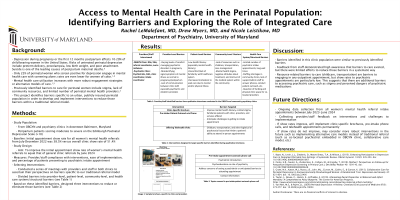Women's Mental Health
Session: Poster Session
(215) Access to Mental Health Care in the Perinatal Population: Identifying Barriers and Exploring the Role of Integrated Care

Trainee Involvement: Yes

Rachel LeMalefant, MD (she/her/hers)
Psychiatry Resident
University of Maryland Medical Center
Baltimore, Maryland, United States
Drew Myers, MD
PGY-3 Psychiatry Resident
University of Maryland Medical Center
Baltimore, Maryland, United States- NL
Nicole Leistikow, MD
Assistant Professor
University of Maryland School of Medicine
Baltimore, Maryland, United States
Presenting Author(s)
Co-Author(s)
Background/Significance: Perinatal depression affects between 10-20% of women in the United States, increasing the risk of adverse birth outcomes and poor or absent maternal-infant bonding if left untreated (Van Niel, 2020). Integrated care interventions, from co-location of psychiatric and obstetric providers to more specific implementation of the collaborative care model, have been shown to improve access to psychiatric care in the perinatal population (Byatt, 2018; Grote, 2015). Conclusion/Implications: More research is needed to understand barriers to mental health treatment in the perinatal population, and further efforts to address these barriers through collaboration with obstetric providers are paramount. Byatt, N., Straus, J., Stopa, A., Biebel, K., Mittal, L., & Moore Simas, T.A. (2018). Massachusetts Child Psychiatry Access Program for Moms: Utilization and Quality Assessment. Obstet Gynecol. 132(2): 345-353. doi: 10.1097/AOG.0000000000002688 Grote, N.K., Katon, W.J., Russo, J.E., Lohr, M.J., Curran, M., Galvin, E., & Carson, K. (2015). Collaborative Care for Perinatal Depression in Socioeconomically Disadvantaged Women: A Randomized Trial. Depression and Anxiety 32: 821-834. doi: 10.1002/da.22405 Van Niel, M.S., & Payne, J.L. (2020) Perinatal Depression: A Review. Cleveland Clinic Journal of Medicine 87(5): 273-277. doi: 10.3949/ccjm.87a.19054
Methods: Participants include women’s mental health referrals from an outpatient women’s health center to a psychiatric clinic. These two clinics primarily serve adults from West Baltimore neighborhoods who have public insurance. Qualitative interviews were conducted with administrative staff involved in the current traditional referral process with the aim of identifying barriers to accessing care specific to this clinic population. To address these barriers, three key interventions will be implemented: 1) distributing a pamphlet with information about common perinatal mental health disorders, treatment options, and pictures of the psychiatric clinic and providers to familiarize patients with psychiatric care, 2) performing patient outreach prior to the intake appointment to engage the patient and anticipate any barriers for that individual, and 3) offering virtual intake appointments for patients who would otherwise be unable to attend in-person due to psychosocial factors. The primary outcome will be patient show rate to initial appointment, with secondary outcomes including objective measurements of anxiety and depression as well as duration and frequency of engagement in psychiatric treatment.
Results: Qualitative interviews with staff identified barriers including poor mental health literacy, societal stigma of mental health treatment particularly during pregnancy, and psychosocial challenges including lack of childcare or reliable transportation to appointments. Data collected from this academic year, July-December 2022, reveals 38.5% of women’s mental health referrals presented to their initial appointment. Further data collection will occur during the next academic year, July 2023-June 2024, after interventions are in place.
Discussion: By identifying barriers specific to this clinic population and designing interventions to mitigate those factors, it is anticipated that attendance to initial psychiatric intake appointments for women’s mental health referrals will increase from the current show rate of 38.5%. This study can serve as a starting point for implementation of further integrated care practices in the future, including co-location of psychiatric residents in the referring OBGYN clinic and/or adherence to a collaborative care model.
References:

